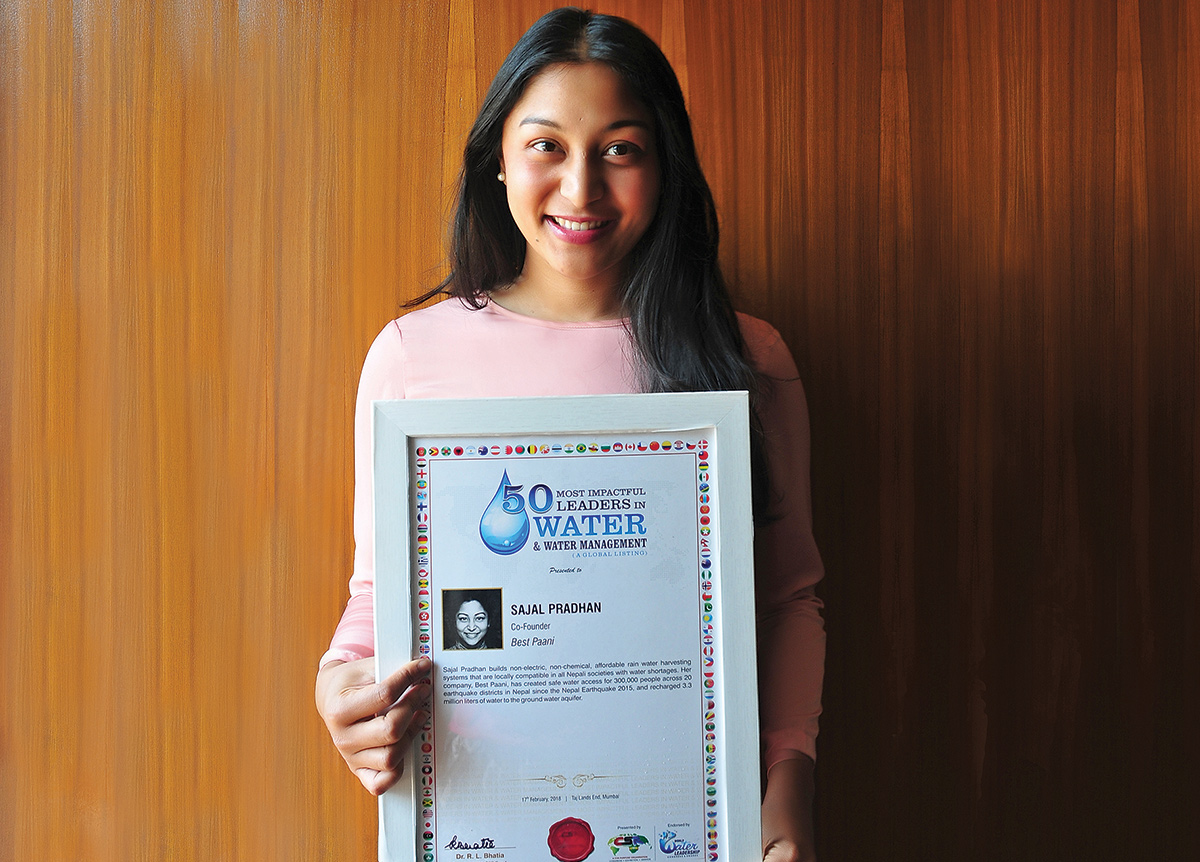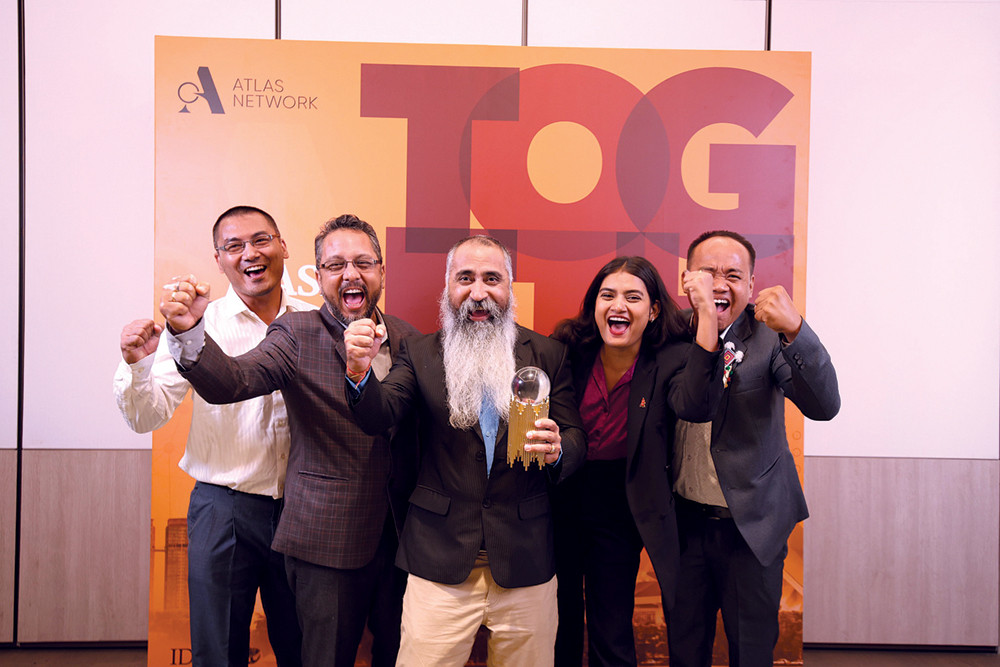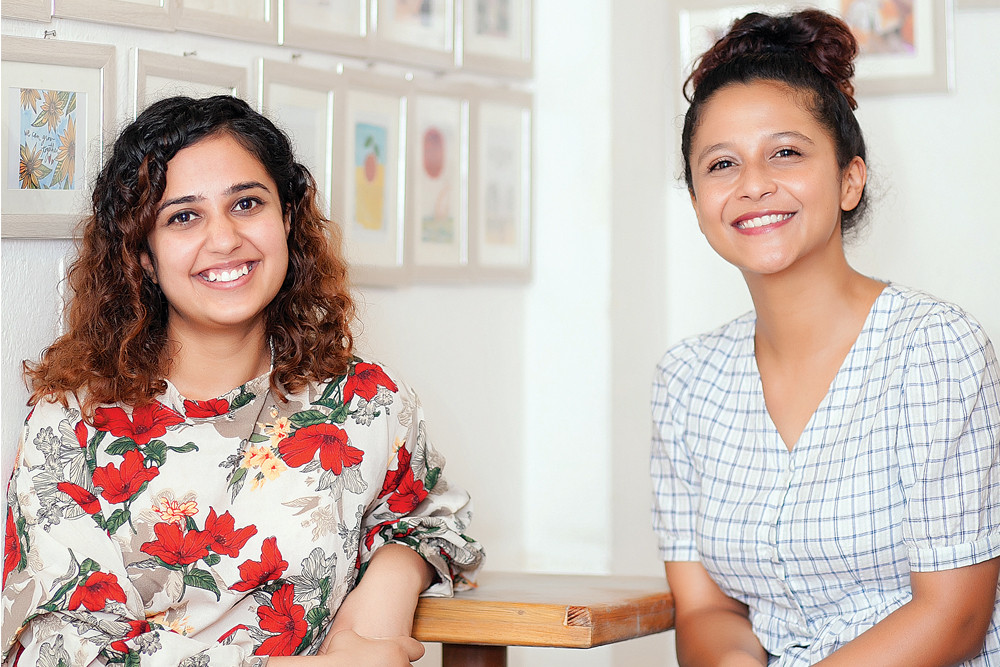
For a planet comprising of almost 70% water, only about 3% is freshwater, the kind we drink, bathe in and irrigate our fields with. If that is not rare enough, two-thirds of this is in the form of frozen glaciers or otherwise unavailable for use.
A lot of the meagre amount left is now rendered useless by pollution. This results in about a billion people with no access to clean water and 2.7 billion find water scarce for at least one month of the year. The future looks very bleak as it is predicted that by 2025 around half of the world’s population will suffer from water scarcity.
Sajal Pradhan attempts to change this situation through her organisation; Best Paani Pvt. Ltd. A scholar of sustainable development, she met her Co-founder, Gokul Dangal, a water engineer, during her second semester while doing her Master’s degree at Kathmandu University. They registered the business barely two months before the earthquake in 2015.
Although planning to focus on rain water harvesting, their first effort was to provide clean water for the earthquake victims in Gorkha, Dhading, Rasuwa, Sindhupalchowk, Dolakha, Kavrepalanchwok, Makawanpur, Sindhuli, Ramechap, Okhaldhunga and Kathmandu. They outsourced a design for bio sand filters made by Dr David Manz in the 1980’s. These filters consist of a biofilm and layers of specially selected and prepared sand and gravel for water filtration. Bio-sand filter is very suitable to use and practice at the household level. It is smaller and adoptable for intermittent use. It reduces discolouration, odour, unpleasant taste. Due to its effectiveness, reliability and low cost, it is an appropriate technology in most developing countries. It is estimated that over 2,00,000 bio-sand filters are in use worldwide.
“The raw materials like sand were procured from West Nepal making this a fully vernacular filter. The low tech filters, no electricity or chemicals needed, made a huge impact,” informs Pradhan. They made enough of these for 3,00,000 people across 20 districts affected by the earthquake. This was done with six people in the team and was distributed as charity. Best Paani attempts to focus on building low technology equipment with high impact which is affordable for those who really need it.
The organisation now integrates rain water harvesting into buildings. These systems are capable of removing a household off the grid which means they would not have to depend on any other water sources. This amounts to about 200 cubicmeter of water annually for a family of five. One of the filters used in these systems will cost Rs. 10,000. If a rain water harvesting system is installed in a public institution, it is capable of supplying clean water to a larger community. A rain water harvesting system installed in a school is capable of satisfying the needs of around 650 people.
Best Paani designs and installs customised large, medium and small scale Ground Water Recharge Systems. The system recharges ground water table with rain water from roof tops and open grounds. They also utilise ways to recycle waste water. The water is treated to make it suitable for the environment. Its treatment aims at reducing the contaminants to acceptable levels to make the water safe for the environment and society.
Sajal Pradhan finds the scope of social enterprises promising in Nepal. In developed countries, the basic needs of people are taken care of hence innovation exists in luxuries and things people do not need for survival. Hence, the returns seem non-existent and innovation often comes to a standstill. Nepal has not reached the point of diminishing return as all people do not necessarily have access to basic needs. “The need for innovative social business is at its peak at the moment,” states Pradhan.
As the world progresses, society cannot remain inflexible. A lot of doubts exist with drinking rain water. But the advantages are enormous and could offer a solution to our pressing water-related problems. Other than the acceptance of such ideas, the participation of public is very important. Abstaining from wasting water, spreading awareness, keeping surroundings clean will go a long way in saving the environment.
The government plays a huge role in adapting to climate change. Alongside social businesses and NGOs, this nexus of organisations is an amazing way of delivering solutions in Nepal. If supported by the huge power and influence of the government, such business models will be able to accomplish much more. It is usually social businesses who push for the government to create policies regarding environmental problems. Best Paani attempts to convince the government to make rain water harvesting mandatory in new buildings.
Even though the business has reached break-even point, Pradhan does not consider it a success yet. Even though their work has managed to contribute to society, she believes that unless the company is contributing to sustainability it cannot claim success.
Clean water and sanitation is one of the goals for sustainable development. Ensuring universal access to safe and affordable drinking water for all requires that we invest in adequate infrastructure, provide sanitation facilities, and encourage hygiene at every level. Protecting and restoring water-related ecosystems such as forests, mountains, wetlands and rivers is essential if we are to mitigate water scarcity.
Recognised as one of the 50 Most Impactful Leaders in Water & Water Management (Global Listing) at the World CSR (Corporate Social Responsibility) Day, Best Paani hopes to innovate to sustain.


.jpg)


.jpg)